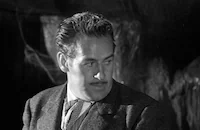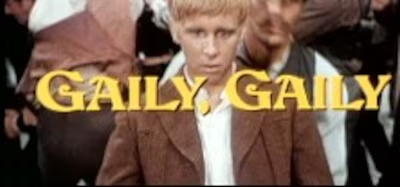Gaily, Gaily

Brief Synopsis
Cast & Crew
Norman Jewison
Beau Bridges
Melina Mercouri
Brian Keith
George Kennedy
Hume Cronyn
Film Details
Technical Specs

Synopsis
The Galena, Illinois, Independence Day celebration in 1910 seems to young Ben Harvey an ideal time to seek out his own destiny, and with his meager savings, he sets out by train for Chicago, where he is soon pickpocketed and faints from hunger. He is rescued by Queen Lil, handsome proprietress of the Midwest's most elegant and finely furnished brothel, who takes to his innocence and installs him on the top floor of her house. Totally ignorant of the nature of his surroundings, he awakes the following morning to find Adeline, who he believes is a charming and innocent young lady, offering him a new suit of clothes. Queen Lil continues her patronage by getting Ben a job on the Chicago Journal , and there his resourcefulness wins over gruff but lovable Francis X. Sullivan, an admirer of the celebrated madam. Sullivan takes Ben on a drinking tour of the city's tenderloin, opening the young lad's innocent eyes to the "political realities" of life in the Windy City. Meanwhile, "reform" leader Axel P. Johanson is trying to obtain the "Big-Mitt-Ledger," a record of civic corruption compiled by local boss "Honest" Tim Grogan. During a party for Grogan at Lil's, Ben, by now realizing where he is staying, determines to devote his life to reform and inspires Adeline to similarly change her ways. She does, steals the ledger herself, and joins the Salvation Army mission. As soon as the ledger is found to be missing, Sullivan, Lil, Grogan, and Johanson are all after Ben, but it is Johanson who finds him and has his luscious ward, Lilah, seduce him in order to obtain the ledger. Ben then finds Adeline but mistakes a Salvation Army hymnal for the ledger. Pursued by Grogan and Sullivan, Ben falls from a drawbridge and drowns. But Dr. Tyner, a quack who has been experimenting with adrenalin, manages to revive Ben (who covertly attends his own funeral and witnesses his grandmother hand what she believes is the family Bible to the eulogizing preacher). The august gentleman opens the book and solemnly reads: "... And Johanson greased Judge Rafferty's palm with eight G's. ..." A mad grab ensues for what all recognize to be Grogan's ledger, which is finally entrusted to Queen Lil for safekeeping. The next morning Ben and Adeline are upstairs at Lil's as Sullivan reads from the Chicago Journal headline--"How I Returned From the Dead," by Ben Harvey, assisted by Francis X. Sullivan. (In an alternate ending, Sullivan instead retains the ledger and writes his own story, an exposé of "Corruption in High Places.")

Director

Norman Jewison
Cast

Beau Bridges

Melina Mercouri

Brian Keith

George Kennedy

Hume Cronyn
Margot Kidder

Wilfrid Hyde-white
Melodie Johnson
Joan Huntington

John Randolph
Claudia Bryar
Eric Shea
Merie Earle
James V. Christy
Charles Tyner
Harry Holcombe
Roy Poole
Clarke Gordon

Peter Brocco
Maggie Oleson
Nikita Knatz

Roy Barcroft
J. S. Johnson
Tom Peters
Harvey Jason
Les Podwell
Martin Friedberg
Nora Marlowe
Don Keefer
Crew
Ray Aghayan
Angela Alexander
Del Armstrong
Hal Ashby
Sass Bedig
Alan Bergman
Marilyn Bergman
Carl Biddiscombe
Pat Blyner
Edward G. Boyle
Robert Boyle
Byron Brandt
Naomi Cavin
George Chan
Larry Dewaay
Robert Forrest
Abram S. Ginnes
Sam Gordon
Marvin Gunter
Jerry Howard
Wes Jeffries
Norman Jewison
Richard Kline
Joe Kramer
William Maldonado
Henry Mancini
Robert Martin
Mike Moder
Patrick J. Palmer
Phil Parslow
Gaylin Schultz
Lynn Stalmaster
Ralph Winters
Allen K. Wood

Film Details
Technical Specs

Award Nominations
Set Decoration
Best Costume Design
Best Sound
Articles
Gaily, Gaily
He had an amazing past to look back on. Born in New York and raised in Racine, Wisconsin, he was a child violinist, a circus acrobat, and a Chicago reporter before he was out of his teens. Looking for a more lucrative trade, he set up shop as a Hollywood screenwriter, scripting classics such as Scarface (1932) and Notorious (1946) with remarkable speed. Set in the wild world of Chicago newspapers where Hecht started out as a writer, the stories in Gaily, Gaily were published in Playboy and other magazines before appearing between hard covers. The movie adaptation is the only feature-film screenplay by Abram S. Ginnes, a television writer and playwright who was blacklisted during the anticommunist witch hunt of the 1950s. Aside from the title, the only things he retained from Hecht's book were a few character names, the basic outlines of some plot episodes, and the general idea that Chicago in 1910 was a hotbed of cutthroat journalism, hugely corrupt politics, and frequent eruptions of rambunctious, hard-drinking fun. Ginnes also uses a typically wry Hecht quote to begin the picture: "If you did not believe in God, in the importance of marriage, in the United States government, in the sanity of politicians, in the wisdom of your elders, then you had to believe...in art." That's amusing enough, but it doesn't have anything to do with the movie, since the hero doesn't care much about art and is no more skeptical about society than other characters in the story.
Beau Bridges plays the Hecht character, Ben Harvey, a sixteen-year-old lad whose modest Illinois hometown affords few opportunities for sowing wild oats, of which he has a plentiful supply that are long overdue for sowing. Realizing that a healthy young man like Ben needs to broaden his horizons, his wizened old granny (Merie Earle) persuades his parents (John Randolph and Claudia Bryar) to pack him off to the big city. He arrives there in a state of hunger and confusion, since someone stole all his money on the train, but he has a stroke of luck when a sympathetic older woman (Melina Mercouri) takes him under her wing and invites him to live in her house, which is also occupied by a large number of scantily clad ladies. Her name is Queen Lil and you can guess what kind of house she runs; but Ben's upbringing in the boondocks has taught him next to nothing about the facts of life, and he's happily settled in with his new friends by the time their profession dawns on him. Lil also introduces him to a hard-nosed newspaperman (Brian Keith), who hires Ben as his assistant. Together they embark on a series of journalistic adventures involving Chicago politicians (Hume Cronyn, George Kennedy), an especially attractive member of Queen Lil's ménage (Margot Kidder), and a quack of a physician (Charles Tyner) who thinks a timely shot of adrenalin can literally raise the dead.
Gaily, Gaily director Norman Jewison has built much of his reputation on movies that explore topical issues and political themes, from In the Heat of the Night (1967) and A Soldier's Story (1984) to In Country (1989) and The Hurricane (1999), among others. Yet while Gaily, Gaily contains plenty of politicos, Jewison treats them only as figures of fun-dishonest rascals, to be sure, but safely tucked away in the nostalgically depicted past. Jewison came to Gaily, Gaily with little understanding of Chicago's riotous history, according to screenwriter Ginnes, who said later that Jewison's main concern with the city was whether its mayor, Richard J. Daley, would make it difficult to use the locations they wanted. Jewison arranged a meeting with Daley and arrived at the mayor's office with Ginnes, the art director, and the production manager, only to find that Daley was out of town. Already nervous about locations, and now angry with the city as well, Jewison was on the verge of flying back to Los Angeles and walking out on the picture-but then he saw a newspaper headline, explaining that Daley had fled the city because of a municipal scandal that went public the previous day. Deciding all this was a good introduction to rough-and-tumble Chicago politics, Jewison laughed it off and proceeded with the production as planned.
Gaily, Gaily garnered Academy Award nominations for costume design, art direction/set decoration, and sound. Its bright surfaces aside, though, some critics felt Jewison never did get a handle on Hecht's boisterous vision of Chicago in bygone times. Pauline Kael considered Hecht to be the greatest of all American screenwriters, but faulted Jewison for making the picture "artistic" in ways that violated Hecht's unpretentious realism. When the director "opens a scene through jewelled droplets on a window," she wrote in her New Yorker review, "one can almost hear Hecht roaring obscenities."
Taking the opposite view, New York Times critic Vincent Canby thought Hecht would have found Gaily, Gaily to be a movie of "great and exuberant charm." Canby admits the picture is based on questionable premises-that "harddrinking newspapermen are lovable," for instance--and he notes that while Hecht was a Jewish man born in New York, the filmmakers portray Ben Harvey as "a prototype Anglo-Saxon rube of epic naiveté." Yet the film succeeds, Canby wrote, because Jewison and Ginnes show such respect for the classic conventions of American farce, because Bridges and the supporting cast give first-rate comic performances, and because Jewison captures old Chicago scenes in touching and convincing ways. Hecht might not have recognized this Chicago, the critic concludes, but Mark Twain and Charles Dickens would have loved it.
Producer: Norman Jewison
Director: Norman Jewison
Screenplay: Abram S. Ginnes, based on Ben Hecht's story collection
Cinematographer: Richard H. Kline
Film Editing: Ralph E. Winters, Byron W. Brandt
Production Design: Robert Boyle
Art Direction: George B. Chan
Set Decoration: Edward Boyle
Costume Design: Ray Aghayan
Music: Henry Mancini
Cast: Beau Bridges (Ben Harvey), Melina Mercouri (Queen Lil), Brian Keith (Sullivan), George Kennedy (Johanson), Hume Cronyn (Grogan), Wilfrid Hyde-White (The Governor), Margot Kidder (Adeline), Roy Poole (Dunne), Melodie Johnson (Lilah), John Randolph (Father), Charles Tyner (Dr. Lazarus), Joan Huntington (Kitty), Merie Earle (Granny), Claudia Bryar (Mother), James V. Christy (Frankie Piano), Harvey Jason (Quinn), Maggie Olesen (Mrs. Krump), Lynnea Larson (Sissy), Adele Yoshioka (Suzuki), Jackie Boncy (Claudet), Jade Manhattan (Martine), Lisa Todd (Fanny), Carole Lamond (Phalinx), Mardie March (Mabel), Clark Gordon (Wally Hill).
Color-107m.
by David Sterritt

Gaily, Gaily
Quotes
Ahh, he's stone cold dead.- Francis X. Sullivan
It all sex and money! Sex and money!- Ben Harvey
Trivia
Notes
Locations shot in Milwaukee, Wisconsin, and in Chicago at the Baltimore and Ohio Depot, Lincoln Park, and at the Chicago Auditorium.

Miscellaneous Notes
Released in United States Winter December 1969
Released in United States Winter December 1969














